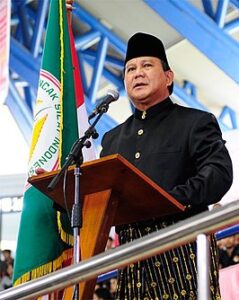Prabowo Subianto: Indonesia’s Defense Minister Poised For Presidency Amid Allegations Of Controversial Past
No Comments yet
Prabowo Subianto – Source: nl.wikipedia.org
02-28-2024 ~ As preliminary results hint at Prabowo Subianto’s victory in Indonesia’s presidential race, political tension rises with Ganjar Pranowo and Anies Baswedan seeking an inquiry into alleged irregularities. Beyond the election drama, Indonesia grapples with persistent issues from economic struggles to foreign relations.
Prabowo Subianto, Indonesia’s defense minister and a former army general, is poised to become the next president of the country. Although the official results are due next month, preliminary figures indicate that Prabowo will secure close to 60 percent of the vote.
Two unsuccessful presidential candidates in Indonesia are calling for an official inquiry into the recent election. Ganjar Pranowo and Anies Baswedan have alleged widespread irregularities in the February 14 election, including instances of vote-buying and intimidation.
Indonesia, Southeast Asia’s largest economy and the world’s most populous Muslim-majority nation, shifted from a 32-year dictatorship to a democracy about 25 years ago. Despite progress, challenges persist like poverty, corruption, environmental degradation, and ethnic and religious divisions.
With vast natural resources, Indonesia actively seeks foreign investment for infrastructure and resource extraction and has strengthened commercial ties with China even while avoiding taking an active position in the escalating U.S.-China rivalry. In this regard, Prabowo will likely continue the policy of his predecessor outgoing President Joko Widodo.
Position by Candidate
The contest for the presidency saw a three-way race between Subianto and former governors Anies Baswedan and Ganjar Pranowo. Subianto, representing the Advanced Indonesia Coalition, is expected to get over 58.84 percent of the votes. Baswedan is likely to come in second with around 24.46 percent, while Pranowo of the Indonesian Democratic Party of Struggle (PDI-P) will come in third with around 16.7 percent of the votes.
Elections were also held for parliament in which 18 parties took part. Parties need to garner a minimum of 4 percent of the total national vote to obtain representation in parliament. In the 2019 elections, 20 parties were in the running, yet only eight successfully secured seats in the House. In this election, while results are yet to be finalized, far-right Islamist groups have suffered a setback.
This is the third time that 72-year-old Subianto, a 72-year-old military general and the son-in-law of dictator Suharto, contested for the presidency. In his earlier attempts in 2014 and 2019, he was defeated by Joko Widodo. This election, however, saw the old rivals coming together with Widodo’s son Gibran Rakabuming Raka, contesting as Subianto’s vice-presidential candidate. While Widodo, who remains immensely popular, did not explicitly back Subianto, the widespread perception was that the ticket had his support and there are allegations that state agencies backed the candidacy of the defense minister.
Subianto was in the thick of military affairs during the brutal Suharto dictatorship. He was a commander of the notorious Kopassus, the special forces unit of the Indonesian Army set up in 1952. The unit has been accused of involvement in torture, extrajudicial killings, and other human rights violations, particularly during periods of political unrest and conflict. Kopassus was alleged to have participated in rights violations in Timor-Leste where an independence movement culminated in its gaining independence in 2002 following UN intervention.
Prabowo himself was for a while barred from travel to the United States due to accusations of human rights violations. He was discharged from the military following similar accusations. In 2023, activists launched a campaign called ‘Don’t Vote for a Kidnapper’ highlighting his alleged involvement in the detention and disappearance of 13 activists who were active in the campaign against the Suharto dictatorship.
Critics have expressed concerns about Subianto’s record during this campaign considering the repression over the years in West Papua where protests have been met with arrests and internet shutdowns. For decades, the people of West Papua have fought against Indonesian occupation, advocating for the right to self-determination. In 2019, the region witnessed widespread protests against racism, intensifying tensions between Papuan demonstrators and security forces.
This election saw a concerted effort to whitewash Subianto’s image with the former general being rebranded as a genial elder. An entire generation has grown up with few memories of the horrors of the Suharto era and Subianto’s role. He also benefited from being seen as the candidate continuing the legacy of Widodo. The outgoing president had contested the previous two elections as the candidate of the center-left Indonesian Democratic Party of Struggle (PDI-P).
The political realignment in this election was one of the reasons for a campaign marked by the absence of any major policy alternatives. While some of Widodo’s decisions, such as the plan to shift the capital from Jakarta, saw much debate, there was little opposition to aspects of his economic legacy, such as the widely opposed Omnibus Bill and other issues raised by labor movements and environmental groups.
Subianto’s main rival was Anies Baswedan, the former governor of Jakarta, who was perhaps the candidate diverging the most from Widodo’s legacy. He was a key opponent of the plan to shift the capital and headed the right-wing Coalition of Change for Unity, garnering support from conservative Islamic groups. The other candidate, Ganjar Pranowo, the former governor of Central Java province who was once seen as a potential successor to Widodo, sought to highlight the PDI-P’s traditional welfarist agenda.
Economic Challenges and Ongoing Struggles
Indonesia has faced tough economic times in its history. There was the Asian Financial Crisis in the late 1990s, which caused a severe recession, social unrest, and the fall of the authoritarian regime led by Suharto. Then, in 2008-09, the global financial crisis brought a slowdown in growth, a bigger current account deficit, and a drop in the value of the country’s currency, the rupiah. The most recent challenge was the COVID-19 pandemic in 2020-21. It made the economy shrink, more people became poor and jobless, and public health and the value of the rupiah fell further. In 2021, the poverty rate in Indonesia stood at 10.15 percent, impacting 27.5 million people. Additionally, the unemployment rate for youth, as a percentage of the total labor force aged 15-24, remains at 14.1 percent.
Indonesia faces several ongoing challenges. One significant issue is the large number of people without jobs or with low-quality jobs, particularly those engaged in low-skilled and informal work. These individuals face difficulties when unexpected events occur, and they lack sufficient social protection. Additionally, Indonesia struggles with competitiveness and productivity due to insufficient infrastructure, a shortage of well-trained individuals, a lack of innovation, and governance issues. This is likely to lead to a decline in the manufacturing sector, a significant contributor to employment. In the long term, it is expected to contribute to a higher unemployment rate and a decline in the standard of living.
Another pressing concern is environmental degradation and climate change, posing risks to the country’s natural resources, biodiversity, and its ability to handle disasters. A survey by Bath University found that 89 percent of Indonesian participants were worried about the potential impact of climate change on their lives, with 66 percent believing they would be directly affected. The highest levels of concern were reported in disaster-prone provinces like Jakarta, South Sumatra, and North Sumatra.
The endorsement of a former Suharto-era general by significant factions of the Indonesian ruling class carries considerable weight. This support is notable in the midst of widespread protests sweeping across Indonesia, where millions are expressing opposition to Israel’s brutal actions in Gaza. Simultaneously, internal social tensions are on the rise due to declining living standards, adding a layer of complexity to the country’s political landscape. The official results and subsequent actions by the incoming administration will determine how Indonesia addresses its multifaceted problems and charts its course in the global arena.
By Pranjal Pandey
Author Bio: This article was produced by Globetrotter.
Pranjal Pandey, a journalist and editor located in Delhi, has edited seven books covering a range of issues available at LeftWord. You can explore his journalistic contributions on NewsClick.in.
Source: Globetrotter
You May Also Like
Comments
Leave a Reply







